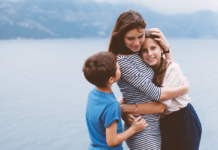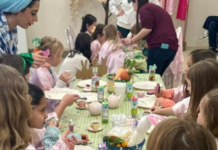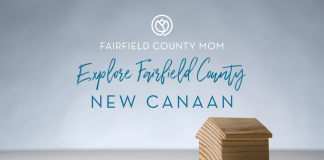On Wednesday night, Jews all over the world will be celebrating the holiday of Passover, a commemoration of when the Jews left Egypt three thousand years ago, a marked journey from slavery to freedom. This year, many of us—Jews and non-Jews alike—are getting a taste of being enslaved, as we are confined to our homes, rather than celebrating the important holidays of Passover and Easter with our extended families. At a Jewish seder, we ask the question, “Why is this night different from all other nights?” and this year, it is a question that rings more true than ever.
But it’s not so different for me; my husband and I experienced an unusual and distressing Passover just last year. It was one year ago that we spent our first-night seder huddled in a tiny hospital room on the 6th floor of Boston Children’s Hospital. A week earlier, our 10-year-old son, Emmet, had undergone a bone marrow transplant, requiring an extended hospital stay while his new stem cells searched for a home in his body.
We had missed many of the preparation rituals that we had grown to love: looking for bread crumbs with a feather and a spoon with Papa; making my mom’s sweet and sour brisket which is second to only Lori Gilbert’s 40-garlic brisket; cleaning the house to rid it of anything that doesn’t spark joy or that might make bread rise.
Nonetheless, I was determined to make Passover as normal as possible. I gathered up the accouterments for our plastic seder plate (except for a shank bone; we used fresh grapes instead. Thanks, Internet!). I found a local kosher supermarket and bought prepared food for my husband Jeff’s and my festive meal. Emmet couldn’t participate because he was on a low-bacteria diet, which prohibits most fresh fruits and vegetables, plus anything “homemade” or not prepared in the hospital.
My family was way ahead of the curve, and they were completely on board in helping us create an unconventional, high-tech holiday. My dad shipped us the family Hagaddahs (the narrative story of the Jews’ exodus from Egypt that we read at our seders) so that we were able to follow along as we streamed my parent’s seder in Florida. They had propped an iPad at the table so that we could participate as if we were there. Emmet made it as far as the first page before drifting off to sleep, fulfilling the commandment beautifully to recline during the seder. Jeff and I sat on the bed/daybed/dining room table in the glow of the iPad, missing our family in real life. But we followed along, entrenching ourselves in the story of our people’s journey from slavery in Egypt to freedom in Israel.
We thought about our own journey, from the time when Emmet was first diagnosed with aplastic anemia in May 2018 to that very day. Emmet’s disease had indeed enslaved our family in both concrete and abstract ways. We had been tethered to a physical place–the hospital—and when we held that first seder, it had been over a month since Emmet had stepped outside into the daylight. He had told us that it literally felt like he was in captivity.
But more than being confined to physical space, we understood freedom in a new way: the real meaning of freedom is being able to do what you love without consequence.
It had been a year since Emmet had been able to ride his skate-board, go on a roller coaster, or play in a baseball game, for fear of uncontrolled internal or external bleeding, an effect of his disease. He had missed two summers at his beloved sleep-away camp. The Haggadah asks us to imagine ourselves as slaves in Egypt, and we appreciated that in a new and profound way. The Hebrew word for Egypt is “Mitzrayim,” which means “narrow.” We felt that narrowness last year.
This year, as our world battles COVID-19 and its scary implications, it seems that everyone else will too.
But, like our ancestors, we didn’t plan to stay in “Mitzrayim,” and we didn’t travel solo. We moved along our journey towards freedom, assisted by brilliant doctors and modern medicine. Despite moments of fear, skepticism, and struggle, we powered through six months in the hospital, like the Jews endured wandering the desert for 40 years until they finally reached Israel— the Promised Land.
Sadly, we didn’t reach ours. Last September, just days before Rosh Hashanah, Emmet passed away. We were crushed. Devastated. It felt impossible that we would ever rise up from the depths of our despair. Our community rallied around us: meals were sent to us for almost 3 months; friends brought coffee in the mornings and showed up for power walks when I was up for them. And thousands of friends have contributed to Emmet’s Playground, which we are building at our synagogue in Emmet’s memory. Each gesture has provided a bit of comfort.
But for the second year in a row, we feel enslaved again, this time to a disease that has kept us—and most of the rest of the world—from celebrating the holidays the way we would like. Most of us are captive in our own homes, detained from having the celebrations we want. In essence, we won’t be with our extended families, we may not be able to obtain the Passover foods we love, and some of us may even be too sick to enjoy even a virtual seder.
While we would trade every morsel of freedom to be in captivity with Emmet, we continue to look forward, looking toward brighter times ahead. What choice do we have? What choice did Moses have? What choice do we all have right now, as we are safest in our own homes and nowhere else?
We keep going, even when it’s excruciating.
So we look ahead hopefully to next year, to a time when we can nudge Grandma to pass the (cheap) Manischewitz wine, or we can give dollar bills to overtired kids who discover the hidden matzah under a cushion on the couch.
But most importantly, we realized that we are not alone, just like the Jews who traveled the desert or anyone who is bound to their homes right now, unable to physically connect with others. We gravitate, instead, to the technology that connects us and organizations that reach out relentlessly. There are virtual seders by the hundred and Zoom Easter dinners. We got through last year’s seder, believing that better things were ahead. Although that didn’t turn out to be true for us, our hope and our community propelled us forward and continues to do so. The last line of the Haggadah reads:
B’Shanah haba’ah Yerushalayim. Next year in Jerusalem.
Jerusalem. The promised land. Maybe the one in Israel or perhaps something else. For Emmet, it probably looked a little like Six Flags. For most of us, now, it may just look like going to the salon for a haircut or to the supermarket without gloves or hugging an old friend you haven’t seen in a long time. We are all living in “Mitzrayim” right now for sure, but next year will be better.
In the meantime, we walk through this desert surrounded by those who lift us up.
 Lisa M. is a grieving mom of Emmet, who passed away September 2019 at age 10. She is dedicating her time now to doing good things in Emmet’s name, primarily building a playground in Stamford that will bring his zest for life and play to other children. She is also a stepmom to three college-age kids and a middle school English teacher and writing coach. She loves to read, write, and have cooking competitions with her husband. She has learned a lot in the last year and hopes to share her experiences to help other people. If you’d like to learn more about Emmet’s Playground, please go to www.emmetsplayground.com
Lisa M. is a grieving mom of Emmet, who passed away September 2019 at age 10. She is dedicating her time now to doing good things in Emmet’s name, primarily building a playground in Stamford that will bring his zest for life and play to other children. She is also a stepmom to three college-age kids and a middle school English teacher and writing coach. She loves to read, write, and have cooking competitions with her husband. She has learned a lot in the last year and hopes to share her experiences to help other people. If you’d like to learn more about Emmet’s Playground, please go to www.emmetsplayground.com



























You are an inspiration to all parents out there who have gone through a horrible loss . U give a meaning to the word “strong “ . I admire your strength and dedication in keeping Emmet’s memories alive . Wishing you a happy holiday and may your memories of that wonderful boy be with you always
Lisa I stumbled upon this by accident not knowing you wrote it until you mentioned Emmet ❤️ You are a brilliant writer and beautiful person. I admire your spirit and am honored to know you. May you continue to be lifted up ?